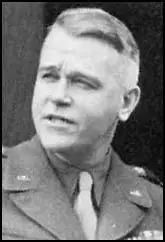Joe L. Collins

Joseph Lawton Collins, the son of Irish immigrants, was born in the United States in 1896. He attended West Point Military Academy and graduated in 1917 (35/139) and joined the United States Army. Commissioned in the infantry he was disappointed not to get sent to Europe during the during the First World War.
Collins eventually became an instructor in the US Army College where he impressed General George Marshall. On the outbreak of the Second World War Collins was appointed chief of staff in the new 6th Corps Headquarters in Birmingham, Alabama.
After Pearl Harbor Collins became chief of staff of the Hawaiian Department. In February 1942 he was promoted brigadier general and three months later was placed in command of the 25th Infantry. Collins and his troops relieved the US Marines on Guadalcana.
In January, 1943, Collins took part in the attack on Kokumbona. This caused some of the most savage fighting of the Pacific War and during the campaign Collins got the name "Lightning Joe".
General Douglas MacArthur considered Collins too young to be a three-star general so George Marshall arranged for him to join General Dwight D. Eisenhower in Britain. Collins was given command of the 7th Corps and during the D-Day landings led his men in securing Utah Beach.
Collins and the 7th Corps made steady progress taking Cherbourg on 27th June and after being held up at St Lo he broke through German lines and was able to help General George Patton and the US 3rd Army in Brittany.
With France liberated Collins and the 7th Corps moved into Nazi Germany through the Aachen Gap. After encountering stubborn resistance from the German Army Collins eventually got into the Ruhr and took Cologne on 11th March 1945. Heavy fighting at Paderborn he defeated General Walther Model and his army of 300,000 men.
Promoted to lieutenant general in April 1945, it is said that German generals considered Collins to be the best US corps commander in Europe.
After the defeat of Germany Collins became chief of staff of the Army Ground Forces but in December 1945 was given the post as the US Army Chief of Information.
Collins remained in Europe after the war and in 1947 was appointed deputy chief of staff to General Dwight D. Eisenhower. He remained in this position when Eisenhower was succeeded by General Omar Bradley in February 1948.
Promoted to full general in 1948 the following year he replaced Bradley as Chief of Staff of the US Army. He also served as the US representative on the NATO Standing Group.
After retiring from the United States Army in 1956, Collins wrote his memoirs, Lightning Joe: An Autobiography (1979). Joseph Lawton Collins died in Washington on 12th September 1987.
Primary Sources
(1) Primo Levi, Survival in Auschwitz (1947)
Last spring the Germans had constructed huge tents in an open space in the Lager. For the whole of the good season each of them had catered for over 1,000 men: now the tents had been taken down, and an excess 2,000 guests crowded our huts. We old prisoners knew that the Germans did not like these irregularities and that something would soon happen to reduce our number.
